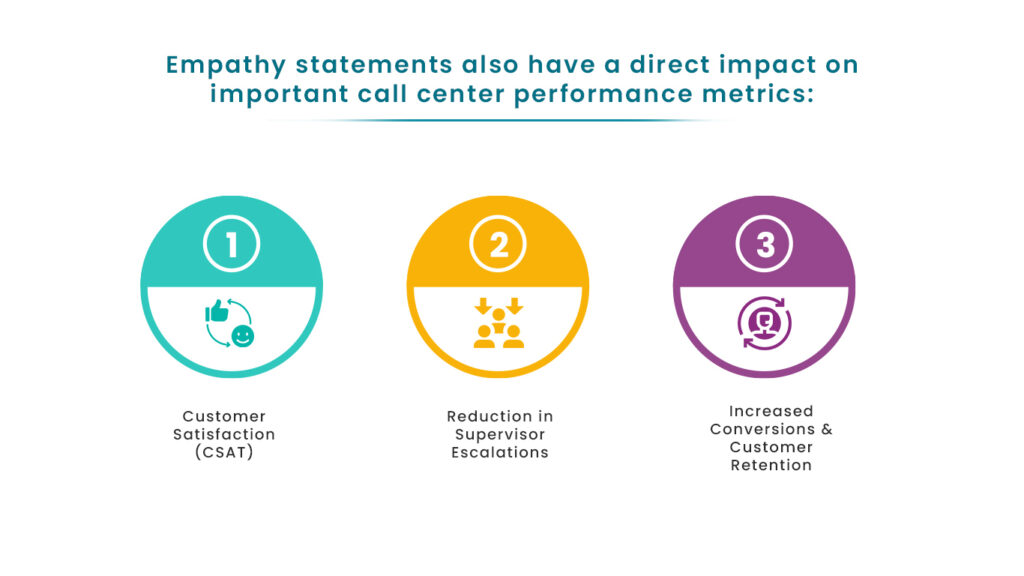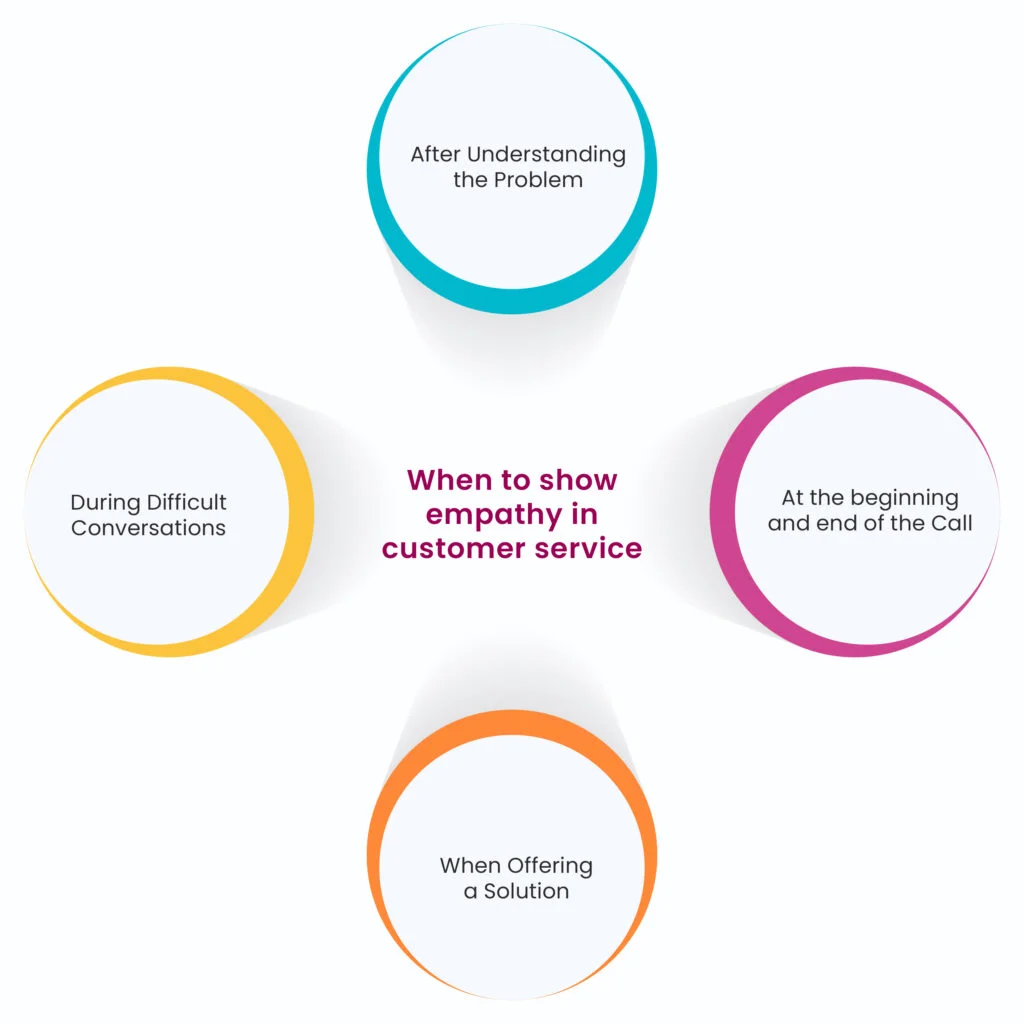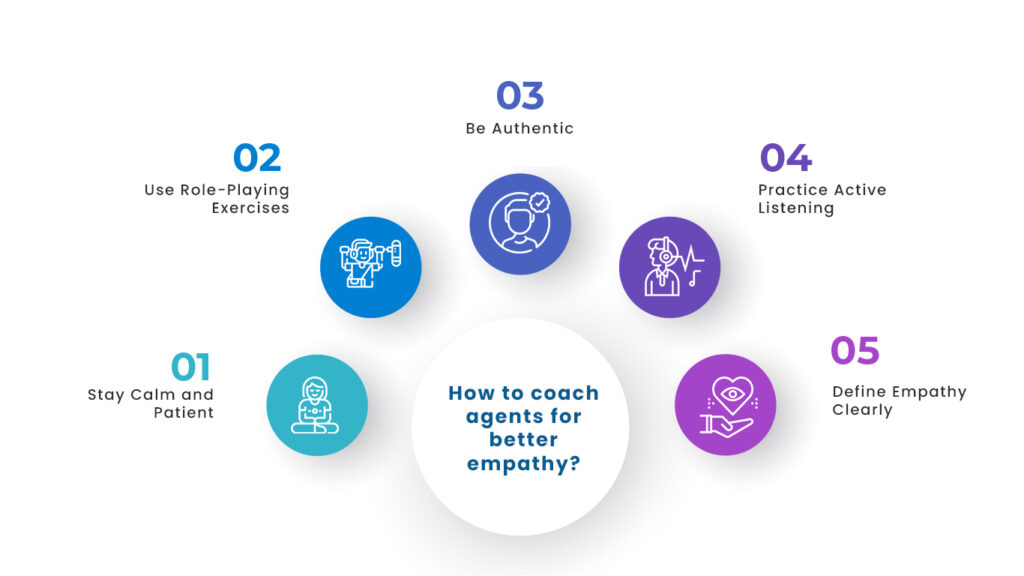“Empathy does not equal agreement.” – Chris Voss. Humans are emotional creatures. Our emotions do influence lots of decisions that we make in our daily lives, don’t they? These emotions often shape our relationships with friends, family, or partners. You might have heard someone say they ended that relationship because they were emotionally unavailable.
Similarly, we often encounter reviews where customers describe their interactions with service agents as rude or insensitive. This highlights a crucial aspect of customer service and empathy: the ability to connect with the customer on an emotional level. In this context, the question arises: how can you empathize with customers’ concerns effectively? Understanding how to show empathy in customer service is crucial for building trust and loyalty, and for managing customer relationships constructively.
In this article, we will explore the importance of empathy in customer service and provide valuable tips and strategies on how to effectively show empathy in customer service.
What are empathy statements for customer service agents?
Empathy statements are short phrases that help customer service agents establish a connection with the customers they are assisting. These statements are a verbal expression that acknowledges and validates a customer’s feelings and concerns. They are a key tool for understanding how to show empathy in customer service. Using empathy statements helps build trust and mutual understanding. When customers feel heard and understood, they are more likely to trust the brand and remain loyal. In difficult customer situations, empathy statements can be crucial for demonstrating understanding and keeping the conversation constructive. They are critically important for the call center’s success
Role of empathy statements for call center agents
When you’re on the other end of the line with a frustrated customer, empathy can be your most powerful tool. Think about it — when was the last time you felt truly understood by someone? It probably made a big difference, right? That’s the power of empathy statements for call center agents: they can transform a tense situation into a more positive experience.
Firstly, these statements help in calming angry or upset customers. Simple, genuine phrases like, “I understand how frustrating this must be for you,” can make customers feel acknowledged, which can defuse tension and build a connection. This also helps the call center agents build a rapport with the customers, showing that they care about their concerns.
Secondly, empathy statements are about active listening. It’s not enough to just solve the problem; you have to show the customer that you’re truly listening to their words, their tone, and the emotion behind them. When you reflect on what they’re saying — not just the facts, but the feelings too — you demonstrate that you understand and care.
Ultimately, empathy statements can significantly enhance the overall customer experience (CX). Empathy statements are a win-win tool for all those involved.
Empathy statements also have a direct impact on important call center performance metrics:
Customer Satisfaction (CSAT)
When agents use empathy to connect on a human level, customers feel valued and heard. This personal connection often results in higher satisfaction scores because customers walk away from the interaction feeling like they’ve been genuinely cared for, not just handled. When customers feel that their concerns are heard and understood, they are more likely to rate their experience positively, improving overall CSAT scores.
Reduction in Supervisor Escalations
A significant number of escalations could be avoided if customers feel that their concerns are being handled empathetically by the initial agent. Empathy statements serve as an effective de-escalation tactic, reducing the need for involving a supervisor and maintaining a smoother call flow.
Increased Conversions and Customer Retention
Empathetic customer service can turn around a potentially negative experience. By resolving customer issues with care and understanding, agents can increase conversion rates and reduce the likelihood of customers taking their business elsewhere.
Examples of empathy statements in customer service
Using empathy statements effectively can create a meaningful connection with customers and help resolve their concerns more smoothly. Here are some examples of empathy statements for call center agents that can be used in different situations:
“I’m sorry to hear that you’re facing this issue. Let’s see how I can help.”
Shows understanding and a willingness to help.
“I can see why you’re upset; I would feel the same way.”
Validates the customer’s emotions and shows empathy.
“I understand how frustrating this must be. I’m here to help you resolve it.”
Acknowledges frustration and reassure the customer that they have your support.
“Thank you for bringing this to our attention. Let’s work on fixing it together.”
Expresses gratitude for the customer’s feedback and a partnership mindset.
“I hear what you’re saying, and I’m going to do everything I can to make this right.”
Emphasizes active listening and commitment to a resolution.
“I would be frustrated too if I were in your position. Let’s find a solution.”
Puts yourself in the customer’s shoes, showing empathy and a problem-solving attitude.
These phrases help convey understanding, show that the agent is genuinely listening, and communicate a readiness to help. By using these empathy phrases for customer service, agents can build rapport and create a positive customer experience, even in challenging situations.
When and how to show empathy in customer service
Showing empathy in customer service goes beyond just saying the right words; it’s about knowing when and how to use those words to make a real difference. Well, agents should use these empathy statements as often as possible. These statements will help them build a good rapport with the customers, show authenticity, and gain their trust. Here are some key moments where empathy can make all the difference:
At the beginning and end of the Call
Set the tone with warmth and openness from the very beginning. If a customer sounds upset or stressed, acknowledge it right away. Always end the conversation on a positive and empathetic note. Saying something like, “I hope this helps, and I appreciate your patience as we worked through it together,” leaves the customer feeling valued and appreciated.
After Understanding the Problem
Once you’ve carefully listened to what the customer is saying, reflect on what you’ve heard to show that you’re on the same page. For instance, “So, it sounds like the delay caused a lot of trouble for you, is that right?” This shows that you’re not just hearing the words, but also grasping the impact on them.
During Difficult Conversations
When a customer is angry or frustrated, your role is to be a calming presence. Show that you’re truly listening by saying, “I totally understand why you’re feeling this way,” which validates their emotions and helps diffuse tension.
When Offering a Solution
When it comes time to present a solution, continue to keep empathy at the forefront. You might say, “I know this probably isn’t the resolution you had in mind, but here’s what we can do to make things right.” This keeps the conversation positive while acknowledging any disappointment.
How to coach agents for better empathy?
Given the importance of empathy statements, coaching is a must. Empathy isn’t just about words; it’s about your entire approach to the conversation. Here are some tips to help make sure your empathy feels real and impactful:
Define Empathy Clearly
Start by ensuring agents understand the difference between empathy and sympathy. Empathy is about understanding and sharing the feelings of another person. It’s the difference between saying, “I can understand how frustrating that must be for you” (empathy) and “I’m sorry you’re going through this” (sympathy). Encourage agents to use personal pronouns and reference the customer’s specific situation to sound more genuine.
Practice Active Listening
Active listening goes beyond just hearing the words. Truly focus on what the customer is saying—not just the words, but the emotions behind them. Listen to their tone, and their pauses, and let them speak without interrupting. This shows you’re fully engaged and care about their experience.
Be Authentic
Authenticity is key. Customers can tell when you’re reading from a script versus when you genuinely care. Speak naturally, in your voice, and let your empathy come through sincerely. Always remind agents to follow through on promises and express genuine gratitude for the customer’s time and business.
Use Role-Playing Exercises
Create role-playing scenarios to simulate real-life interactions. This allows agents to practice delivering empathy statements, active listening, and problem-solving in a controlled environment. Role-playing builds confidence and prepares agents to handle different customer situations with empathy.
Stay Calm and Patient
When faced with a customer who is angry or upset, keep your tone calm and steady. Your calmness can help de-escalate their frustration and keep the conversation productive. This approach will enable agents to handle situations where they must empathize with customers’ concerns effectively, contributing to better overall service.
How AI Can Enhance Empathy in Customer Service
AI technology can significantly enhance how call centers coach for empathy.
Firstly, by automating the QA processes and analyzing 100% of customer conversations, AI identifies patterns and highlights areas where agents can improve their empathetic responses. When you are aware where’s the need for improvement you can provide more personalised agent coaching as well to make better business decisions. It goes beyond just words by using sentiment analysis on 100% of voice calls to gauge emotions through voice tone and pitch, helping pinpoint where empathy is lacking.
AI also provides personalized feedback based on real interactions, enabling agents to refine their approach. Additionally, it flags common customer concerns quickly, allowing agents to prepare more empathetic responses.
Integrating AI into your empathy training strategy ensures that every customer interaction is not only efficient but also genuinely caring and understanding.
How Mihup.ai can help enhance customer empathy
Mihup.ai is designed to empower agents to excel, especially in delivering empathetic customer interactions. Mihup Interaction Analytics (MIA) provides comprehensive call reviews by analyzing 100% of conversations to pinpoint key areas for improvement. Additionally, MIA equips agents with instant feedback and supports agents in delivering personalized, empathetic service while maintaining adherence to key protocols.
Experience the difference for yourself. Request a demo today.








